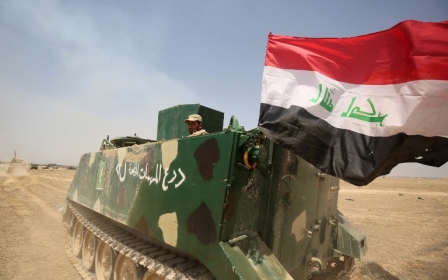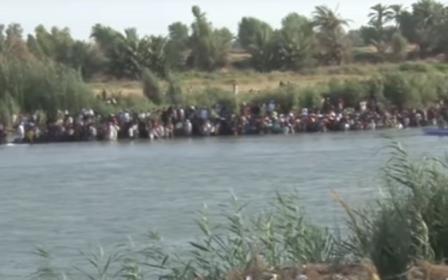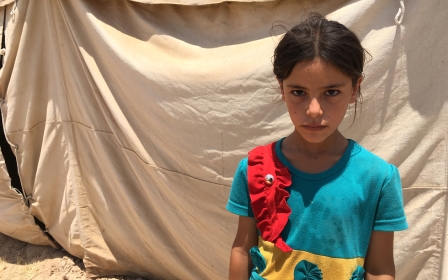Iraqi forces battle IS booby-traps, car bombs in fight for Fallujah

In Iraq’s effort to retake the city of Fallujah from the Islamic State (IS) group, booby-traps are so plentiful that forces are no longer bothering to defuse them, they just blow them up.
Muntadhar, commander of a group of fighters with the Iraqi paramilitary forces, told the Middle East Eye: "The land is totally planted [with roadside bombs]. Even the grass is linked to wires."
He added: "Most of our casualties have come from booby-traps; we stopped defusing them and our new orders are to blast them."
Iraqi security forces with multi-sect paramilitary troops, backed by the US-led international military coalition, began an offensive to retake Fallujah 10 days ago. Despite fierce fighting and thousands of booby-traps set in rural areas around the city, the troops have made progress and by Saturday had made their way inside the city from the southern hub, military officers said.
Officials from the war media group said in a statement on Saturday evening that the "heroes of the Counter-Terrorism Squad units have stormed the city of Fallujah from the southern hub".
The statement offered no further details, but Lieutenant General Abdulwahab al-Saidi, commander of the Fallujah military effort, told MEE that his troops have been fighting inside the city for two days, where the toughest obstacles encountered have been booby-traps, car bombs and suicide bombers.
Muntadhar and his 50-member guerilla unit are among more than 30,000 Iraqi troops battling for Fallujah, which was the first Iraqi city to fall into the militants’ hands, in late December 2013.
The city, on the banks of the Euphrates River just 65 kilometres west of Baghdad, was known as the City of Mosques and Minarets because of the hundreds of mosques built during the administration of former Iraqi president Saddam Hussein.
Fallujah has been a hotbed of Iraqi Sunni Muslim militants since 2003, including al-Qaeda and IS. The city is often seen by Sunnis as a symbol of armed resistance against both American "occupiers" and regional power Iran and its supporters, Shia Muslims.
In return, many Shia Muslims and current Iraqi officials see Fallujah as the main source of suicide car-bombers that target majority-Shia communities in Baghdad.
The Fallujah offensive was launched from four angles to encircle the city, so most fighting so far has taken place either in brushy rural areas or along the river. About 300 Iraqi troops have been killed so far, senior military officers told MEE.
Muntadhar and some of his colleagues have been providing protection for technical teams operating in advance of the troops to secure their routes during battles in northern Fallujah.
By Saturday evening, he was in the back lines in Saqlawiya, a key town where most Shia-dominated paramilitary troops were resting after finishing their parts of the battle plan. Muntadhar was evacuating one of his fighters, who had been wounded in the face as he tried to defuse a bomb.
"They set a booby-trap in every single tree, hill and building. Anything that could be used as a refuge to avoid snipers was converted into an ambush," Muntadhar, said.
"The ambushes were arranged in multiple straight lines. The distance between each was no more than three metres, and if you escaped the first ambush, the second one would get you," he said. "We were provided with Molotovs and hand grenades to blast them, no defusing them any more," he said, while trying to take off his boots for the first time in 12 days to treat his sore feet.
New tactics
The Fallujah military operation was designed to include the limited participation of irregular paramilitary units and to be achieved with minimum of casualties among the troops and civilians who remain trapped inside the city.
Iraqi federal and local officials say there may be 50,000 civilians still inside. A few thousand families made it out before the IS militants erected firewalls to block the troops’ advance and imprison civilians inside, according to the UN and local officials.
The UN mission in Iraq on Thursday warned of a catastrophe among civilians as IS has begun using them as human shields.
Iraqi military officers who had been saying for days that they planned to storm the city now say they have slowed their advance to avoid mistakes that could lead to civilian casualties.
A short video published by a cameraman showed several families making their way across the river, with IS militants shooting at them as they tried to leave a rubber boat and move on behind the frontlines.
"The battle in Fallujah is a life or death fight, so Daesh [another name for IS] is looking to delay its liberation as long as they can, hoping that a miracle may force the government to pull back its troops," Saied al-Jiyashi, an Iraqi security analyst, told MEE.
"They have been using civilians as shields because they know it is the best way to win more time and portray the battle as a sectarian one between Shias [the bulk of security forces] and Sunnis [those inside Fallujah]," Jiyashi said.
Stay informed with MEE's newsletters
Sign up to get the latest alerts, insights and analysis, starting with Turkey Unpacked
Middle East Eye delivers independent and unrivalled coverage and analysis of the Middle East, North Africa and beyond. To learn more about republishing this content and the associated fees, please fill out this form. More about MEE can be found here.




